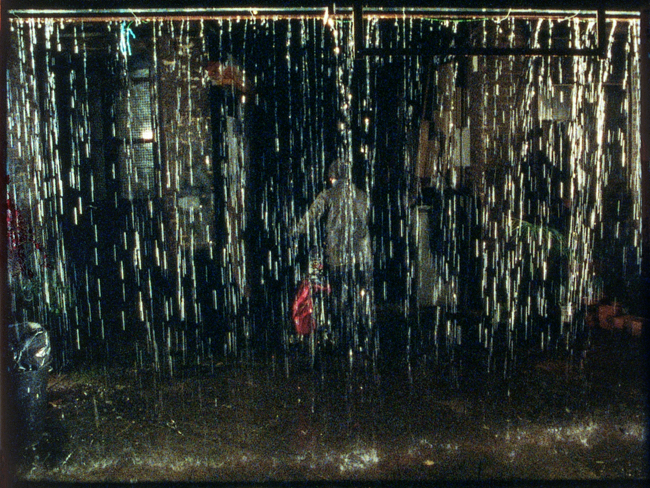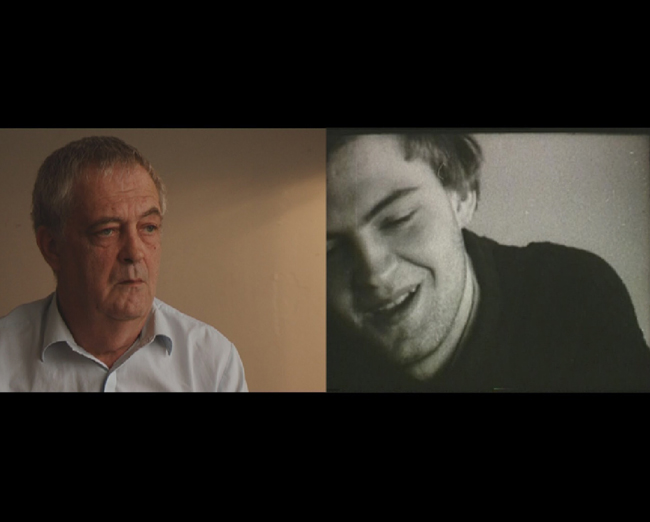Screening: Sarah Dobai and LITTLE WARSAW
Friday 10 October 2025
6-9pm
Booking is essential: please
contact
danielle@daniellearnaud.com
Doors open at 6pm. The screening
will start promptly at 6.30pm
Danielle Arnaud is pleased to
present a screening of two films featuring Sarah Dobai’s
Yard and Little Warsaw’s Game of Changes,
followed by a discussion with the artists in conversation
with curators
and art historians Maja and Reuben Fowkes. The screening
event serves as a precursor to the group exhibition of Sarah
Dobai and Little Warsaw, opening at Danielle Arnaud in
January 2026.
Sarah Dobai
Yard 2001

Sarah Dobai
Yard 2001, 6 minute single screen projection, 16mm
tranferred to 2K
A fixed frame depicts a courtyard at night. The space is at
once interior and exterior; a walled room that is outside
a building but enclosed by it. Like the classic stage or film
set the frame pictures a three sided space, which is
viewed from the perspective of a transparent fourth wall.
The tungsten lights which illuminate the yard accentuate a
doorway and window which opens on it, a dustbin, some potted
plants which move gently in the breeze. In the middle of the
image a large penetrably dark square registers a passageway
which gives onto the street outside. The architecture and
lighting of the scene suggest the yard as a kind stage - a
space consumed by thesense of expectation it provokes.
The 6 minute film records the duration of an apparent
rainstorm in the courtyard which starts suddenly just
afterthe beginning of the film and stops equally abruptly
just before it send. Though peripheral activity occurs within
the frame; a figure passing through the yard, a door opening
and closingagain, the rainstorm is the event, the drama and
the story of the film.
As the torrential rain pours
through the 6 minutes of the work the sense of the tension,
expectation and affect that it evokes increases. The
intensity of the scenario increases not because the storm
becomes more violent but through the cumulative nature of
the way that one experiences something through time.
LITTLE WARSAW
Game of Changes
2009

LITTLE WARSAW, Game of Changes, 2009, video, 6'30".
A film essay based on the idea of the “time gap” brings together footage from a 1971 and shots taken in 2009, in which the same character is portrayed. The original film material comes from a black and white experimental feature film, in which we can see a student discussing his relation to the outside world in relation to perception, learning and self expression. Later on, this student will become a painter and university professor. He is questioned about the same issues 38 years later. How did he relate to the outside world then and now?
The screening will be followed by a discussion between the artists and curators and art historians Maja and Reuben Fowkes.
Sarah Dobai works with photography, film, publication and performance to explore authorship and representation. Her recent works look to classic works of cinema or literature as a means to reflect on contemporary concerns in a historical setting. Her recent film The Donkey Field was shown at Whitechapel Art Gallery, Danielle Arnaud Gallery & the Imperial War Museum (London) and Olomouc Museum of Modern Art. Her work has been widely exhibited internationally and has had recent solo shows at Glassyard Gallery (Budapest), Or Gallery (Vancouver) and FILET (London). She is a Reader in Photography, Text and Film- based Practice and is a Senior Lecturer in Fine Art at Chelsea College of Arts, University of the Arts, London.
LITTLE WARSAW is the
collaborative practice of András Gálik and Bálint Havas, active since 1995.
They live and work in Budapest. Conceived as an evolving
project, Little Warsaw addresses historical memory and
confronts personal encounters with social experience
through films, installations, and a wide variety of
media. By examining the role of the artist not only as a
producer of images, objects, or situations but as an
active agent in shaping the context in which they are
embedded, Little Warsaw’s manifold investigations
present the artwork itself as a subject of political,
sociological, and ideological changes. In recent years, their
personal perspectives have become more interwoven with
their collaborative work, particularly in how their
individual micro-histories and family legends intersect
with broader political and social contexts. The radical
gestures of intervention in their early works are often
complemented by a more poetic form of expression, that
of literature. At their solo exhibition at Secession
Vienna, they presented a group of works centred around a
collectively written novel fragment, Naming You.
Since 2003, Little Warsaw’s work has been widely exhibited internationally. They have had solo exhibitions at Museum Abteiberg, Mönchengladbach; AZKM; Galerie für Zeitgenössische Kunst GFZK, Leipzig; and Secession, Vienna.Their projects have been included in the 2nd Berlin Biennial; the 50th Venice Biennale; Manifesta 7 in Rovereto; the 12th Bienal de Cuenca; as well as in numerous group exhibitions throughout the world — e.g., Time and Again at Stedelijk Museum, Amsterdam; Re_dis_trans – Voltage of Relocation and Displacement at Apexart, New York; and the travelling exhibition Tee with Nefertiti at Mathaf, Doha, Qatar; IVAM, Valencia; and Institut du Monde Arabe, Paris; Not In My Name at CCA, Tel Aviv; OFF-Biennale, Budapest; and The Problem of God at K21 – Kunstsammlung Nordrhein-Westfalen, Düsseldorf; Little Warsaw’s works are held in several prestigious international public and private collections, such as: Centre Pompidou, Paris; MUDAM – Musée d’Art Moderne Grand-Duc Jean, Luxembourg; Ludwig Museum – Museum of Contemporary Art, Budapest; Muzeum Współczesne, Wrocław; Kontakt — The Art Collection of ERSTE Foundation, Vienna; Carré d’Art – Musée d’Art Contemporain, Nîmes; Art Collection Telekom, Frankfurt; and Kadist Foundation, Paris.
Maja and Reuben
Fowkes are curators and art historians in the
Department of History of Art, University of East Anglia
and visiting researchers at the Institute of Advanced
Studies, University College London. They work on the
twentieth-century art history of global socialisms and
contemporary artistic engagements with ecology, climate
and the Anthropocene. Their publications include Art
and Climate Change (Thames & Hudson, 2022),
Central and East European Art Since 1950 (Thames &
Hudson, 2020), and a special issue of ARTMargins on the
Socialist Anthropocene in the Visual Arts (June
2025), along with a forthcoming edited volume
Revolutionary Drills: Art and Extractivism in the
Socialist Anthropocene (Amsterdam University Press,
2026). Maja is also the author of The Green Bloc:
Neo-avant-garde Art and Ecology under Socialism
(CEU Press, 2015), and Reuben edited a special issue of
Third Text on Actually Existing Art Worlds of
Socialism. They publish extensively in
peer-reviewed journals, edited books, exhibition
catalogues and on contemporary art platforms including
Art Monthly, Texte zur Kunst and Springerin, and co-host
the SAVA podcast Left to be Desired. Their
curated exhibitions include “Colliding Epistemes”
at Bozar Brussels (2022) and “Potential
Agrarianisms” at Kunsthalle Bratislava (2021), and
they led the Getty Foundation project Confrontations:
Sessions in East European Art History (2018-22). Maja is
Principal Investigator of the European Research Council
(ERC) and UK Research and Innovation (UKRI) Consolidator
Grant project on the Socialist Anthropocene in the
Visual Arts (SAVA) (2022-27).